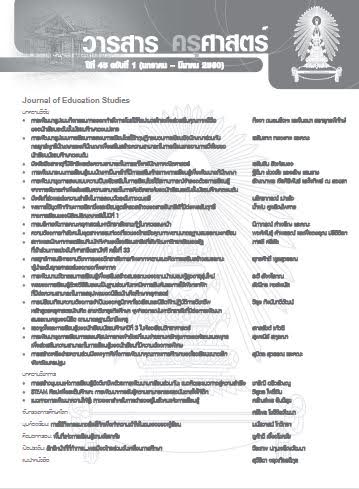ปัจจัยที่ส่งผลต่อความสำเร็จในการสอบวัดระดับทางดนตรี
Keywords:
การสอบวัดระดับทางดนตรี, การเตรียมความพร้อม, ปัจจัยทางดนตรี, GRADED MUSIC EXAMINATION, PREPARATION PROCESS, MUSICAL FACTORSAbstract
งานวิจัยฉบับนี้เป็นการวิจัยเชิงคุณภาพ เพื่อศึกษาปัจจัยที่ส่งผลต่อการประสบความสำเร็จและการเตรียมความพร้อมของครูผู้สอนและนักเรียนในการสอบวัดระดับทางดนตรีมาตรฐานสากล ประชากรที่ใช้ในการวิจัยครั้งนี้ คือ บุคคลที่มีประสบการณ์เกี่ยวกับการสอบวัดระดับทางดนตรีมาตรฐานสากลของสถาบัน Trinity College London ในการสอบเกรดวิชาปฏิบัติเปียโนในระดับชั้นสูงจากโรงเรียนดนตรีเอกชนนอกระบบในเขตกรุงเทพมหานคร โดยกลุ่มตัวอย่างมีจำนวนทั้งหมด 30 คน คัดเลือกโดยวิธีเฉพาะเจาะจง แบ่งออกเป็น 3 กลุ่ม ได้แก่ (1) ครูเปียโนที่มีประสบการณ์ในการส่งนักเรียนสอบอย่างต่อเนื่องเป็นระยะเวลา 5 ปีขึ้นไป จำนวน 15 คน (2) นักเรียนที่มีประสบการณ์การสอบ และได้ผลสอบผ่านตั้งแต่การสอบครั้งแรก จำนวน 10 คน และ (3) นักเรียนที่มีประสบการณ์การสอบเป็นจำนวนตั้งแต่ 2 ครั้งขึ้นไป จึงจะได้ผลสอบผ่าน จำนวน 5 คน เครื่องมือที่ใช้ในการวิจัยคือ แบบสัมภาษณ์ที่ผู้วิจัยสร้างขึ้น ทำการสัมภาษณ์กลุ่มตัวอย่างแบบไม่เป็นทางการคนละประมาณ 1-2 ชั่วโมง
ผลการวิจัยพบว่า ครูจะสอนองค์ประกอบทางดนตรี ได้แก่ ทำนอง จังหวะ การประสานเสียง รูปแบบโครงสร้างทางดนตรี และองค์ประกอบทางดนตรีด้านการแสดงออกทางด้านแนวคิด อารมณ์ ความรู้สึกทางดนตรี รวมทั้งทักษะทางดนตรี ได้แก่ การฟัง การร้อง การเล่น การเคลื่อนไหว การสร้างสรรค์ และการอ่าน ให้แก่นักเรียนตั้งแต่การเรียนในระดับพื้นฐานสะสมเรื่อยมาอย่างต่อเนื่อง ทำให้นักเรียนระดับชั้นสูงมีความรู้และความเข้าใจเกี่ยวกับดนตรีมากพอสมควร ส่วนใหญ่ใช้เวลาเพื่อเตรียมตัวสอบในแต่ละเกรดเป็นระยะเวลาประมาณ 1 ปี ครูจะวางแผนการสอนและแบ่งเวลาการสอนในแต่ละชั่วโมงให้เหมาะสมสำหรับการเตรียมตัวในแต่ละช่วง เพื่อให้นักเรียนมีความพร้อมทุกด้าน ส่วนนักเรียนทั้งสองกลุ่มส่วนใหญ่มีความรู้ความเข้าใจเกี่ยวกับองค์ประกอบและทักษะทางดนตรีพอสมควร แต่นักเรียนที่สอบผ่านตั้งแต่ครั้งแรกจะฝึกซ้อมเปียโนอย่างสม่ำเสมอทุกวัน และฝึกซ้อมตามการบ้านที่ครูสั่งในแต่ละอาทิตย์อย่างเคร่งครัด โดยมักเริ่มฝึกซ้อมด้วยการเล่นบันไดเสียงหรือแบบฝึกหัดที่สอดคล้องกับบทเพลงที่ต้องเล่นก่อน ส่วนนักเรียนที่สอบตั้งแต่ 2 ครั้งขึ้นไปจึงจะสอบผ่านนั้นไม่ได้ฝึกซ้อมเปียโนอย่างสม่ำเสมอทุกวัน ส่วนใหญ่เลือกที่จะฝึกซ้อมแต่บทเพลงเพียงอย่างเดียวก่อน ไม่ค่อยฝึกซ้อมแบบฝึกหัดหรือบันไดเสียงมากนัก
This qualitative research study was designed to determine the factors affecting preparation process and success of teachers and students in graded music examinations. The study focused on population with experience in taking the piano grade examination by the Trinity College London, organized by private schools in Bangkok area. A group of thirty participants was selected, using purposive sampling, and separated into three groups according to their status and qualification. These groups were: (1) fifteen piano teachers who have consistently submitted their students into the examination during the past five years, (2) ten students who passed the examination on their first application, and (3) five students who passed the examination on their second application, or after. Each participant was subjected to an informal interview, approximately one to two hours in duration.
The results revealed that teachers have incorporated elements of music – such as melody, rhythm, harmony, form, and expression – and other musical skills – such as listening, singing, reading, improvising, and movements – in their lessons at an early stage of studying. Consequently, a considerably high level of knowledge and understanding in the subject were found in their advanced students. In most cases, the duration of the preparation process leading to the examination was one year. During which the teachers planed each lessons according to the needs of each of their students. The results also revealed that both groups of students exhibited similar level of knowledge and understanding in the musical aspects and performance skill. However, students highly achieved stated that they had regular practice sessions daily, and they strictly followed their teachers’ instructions. Their practice sessions usually began with scales and studies, or etudes, which related to the examination pieces. In contrast, students in another group stated that they did not have regular practice sessions, and rarely practice scales and studies, or etudes. They focused largely on their examination pieces.




